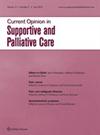The EORTC QLQ breast modules and the FACT-B for assessing quality of life in breast cancer patients - an updated literature review.
IF 2
4区 医学
Q3 HEALTH CARE SCIENCES & SERVICES
Current Opinion in Supportive and Palliative Care
Pub Date : 2024-09-12
DOI:10.1097/spc.0000000000000724
引用次数: 0
Abstract
PURPOSE OF REVIEW Two commonly used quality of life questionnaires in breast cancer are EORTC QLQ-BR23, the FACT-B, and the extended FACT-B + 4. More recently, the EORTC EORTC QLQ-BR42 was developed. This systematic review compares the various versions of the EORTC QLQ and FACT tools for breast cancer in terms of their content, validity, and psychometric properties. RECENT FINDINGS Thirty-six studies met the inclusion criteria. All questionnaires have been proven to be valid, reliable and responsive. The provisional EORTC QLQ-BR45 transitioned to the EORTC QLQ-BR42 in Phase IV of its development, which encompasses the side effects associated with the latest breast cancer treatments. Both the EORTC and FACT measures assess physical and mental dimensions of quality of life, with the EORTC measure placing relatively more emphasis on physical content and FACT placing relatively more emphasis on mental (social and emotional) content. The four additional items in the FACT-B + 4 were developed to address arm lymphoedema following axillary surgery. SUMMARY The development and uptake of quality of life tools are essential in the evaluation of breast cancer treatments. The EORTC QLQ-BR42 and FACT-B are both valid, reliable, and responsive QoL questionnaires.用于评估乳腺癌患者生活质量的 EORTC QLQ 乳房模块和 FACT-B - 最新文献综述。
综述目的两种常用的乳腺癌生活质量调查问卷是 EORTC QLQ-BR23、FACT-B 和扩展的 FACT-B + 4。最近又开发了 EORTC EORTC QLQ-BR42。本系统性综述从内容、有效性和心理测量学特性等方面对不同版本的乳腺癌 EORTC QLQ 和 FACT 工具进行了比较。所有问卷均被证明有效、可靠且反应灵敏。临时 EORTC QLQ-BR45 在其开发的第四阶段过渡到了 EORTC QLQ-BR42,其中包括与最新乳腺癌治疗相关的副作用。EORTC 和 FACT 测量方法都对生活质量的生理和心理层面进行评估,其中 EORTC 测量方法相对更重视生理内容,而 FACT 则相对更重视心理(社交和情感)内容。FACT-B + 4 中的四个附加项目是针对腋窝手术后手臂淋巴水肿而开发的。EORTC QLQ-BR42 和 FACT-B 都是有效、可靠且反应迅速的生活质量问卷。
本文章由计算机程序翻译,如有差异,请以英文原文为准。
求助全文
约1分钟内获得全文
求助全文
来源期刊

Current Opinion in Supportive and Palliative Care
HEALTH CARE SCIENCES & SERVICES-
CiteScore
3.70
自引率
0.00%
发文量
54
期刊介绍:
A reader-friendly resource, Current Opinion in Supportive and Palliative Care provides an up-to-date account of the most important advances in the field of supportive and palliative care. Each issue contains either two or three sections delivering a diverse and comprehensive coverage of all the key issues, including end-of-life management, gastrointestinal systems and respiratory problems. Current Opinion in Supportive and Palliative Care is an indispensable journal for the busy clinician, researcher or student.
 求助内容:
求助内容: 应助结果提醒方式:
应助结果提醒方式:


